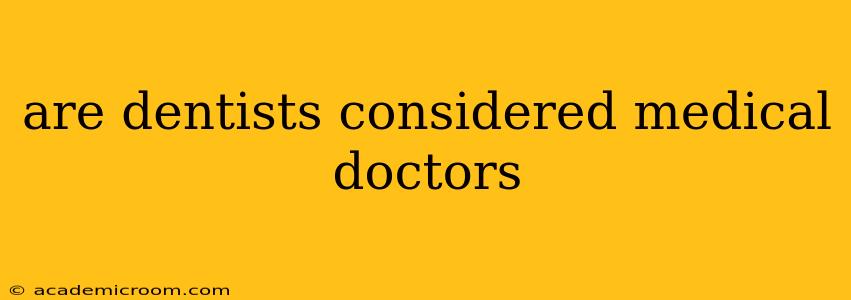Are Dentists Considered Medical Doctors?
The short answer is no, dentists are not considered medical doctors (MDs) or doctors of osteopathic medicine (DOs). While both dentists and medical doctors are healthcare professionals requiring extensive education and training, their areas of expertise and scope of practice differ significantly. This distinction is reflected in their educational pathways and licensing requirements.
This article will delve into the key differences and address common questions surrounding the professions.
What is the Difference Between a Dentist and a Medical Doctor?
The core difference lies in their focus: Medical doctors diagnose and treat diseases and injuries affecting the entire body. Their training encompasses a wide range of medical specialties, from cardiology and oncology to neurology and pediatrics. Dentists, on the other hand, specialize in the diagnosis, prevention, and treatment of diseases and conditions affecting the oral cavity—teeth, gums, jaws, and the surrounding soft tissues. Their training is focused on oral health and related systemic conditions that can manifest in the mouth.
What kind of education do dentists receive?
Dentists undergo rigorous training, earning a Doctor of Dental Surgery (DDS) or Doctor of Dental Medicine (DMD) degree after completing four years of dental school. This follows completion of a four-year undergraduate degree. Their curriculum focuses heavily on oral anatomy, physiology, pathology, and various dental procedures like restorative dentistry, endodontics, periodontics, and orthodontics. Many dentists then pursue further specialization through residencies and fellowships in specific areas of dentistry.
Do dentists have medical knowledge?
While dentists are not medical doctors, they possess a significant amount of medical knowledge, particularly concerning the connection between oral health and overall well-being. For example, dentists are trained to recognize oral manifestations of systemic diseases like diabetes and HIV. They understand the importance of oral hygiene in preventing cardiovascular disease and other health problems. However, their expertise is specifically focused on the oral cavity and its relationship to systemic health. They are not trained to diagnose and treat systemic illnesses in the way that medical doctors are.
Can dentists prescribe medication?
Yes, dentists can prescribe medication, but their prescribing authority is generally limited to medications related to their scope of practice—pain relievers, antibiotics for oral infections, and medications to manage oral conditions. The specifics of their prescribing authority vary depending on the jurisdiction and their individual state licensure. They cannot prescribe medications for systemic illnesses outside of their dental expertise.
What are the similarities between dentists and medical doctors?
Both dentists and medical doctors share several similarities:
- Extensive education and training: Both require years of intensive study and clinical practice before licensure.
- Licensure and regulation: Both professions are heavily regulated to ensure patient safety and quality of care.
- Commitment to patient well-being: Both are dedicated to providing the best possible care for their patients.
- Diagnostic skills: Both must utilize diagnostic skills to assess patients' conditions and develop treatment plans.
In conclusion, although both professions serve the greater healthcare system, dentists and medical doctors have distinct roles and training. Dentists are not medical doctors, focusing on oral health, while medical doctors address a broader range of health conditions. Understanding these differences is essential for both patients and healthcare professionals alike.
